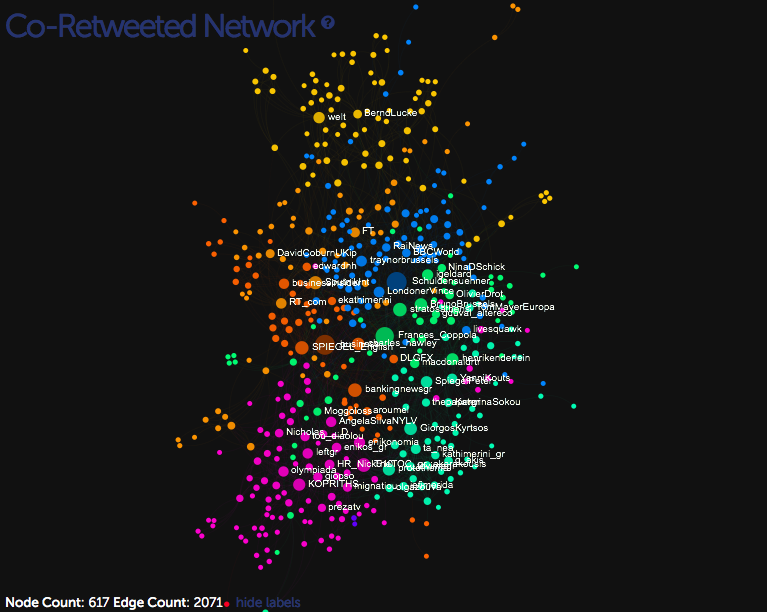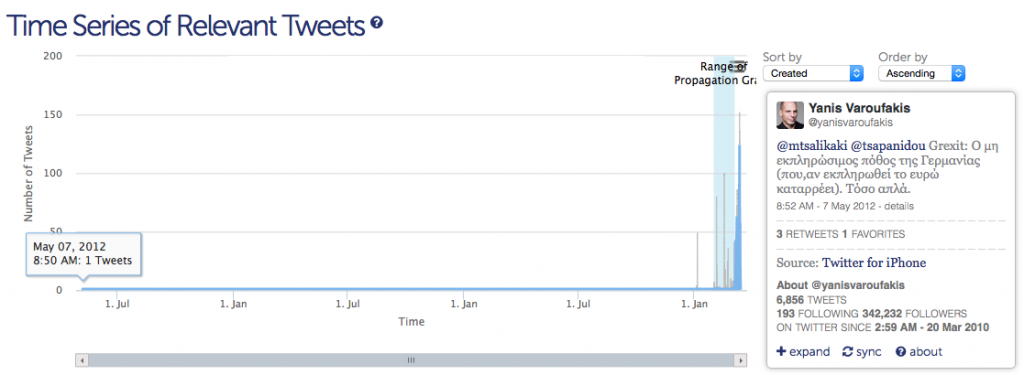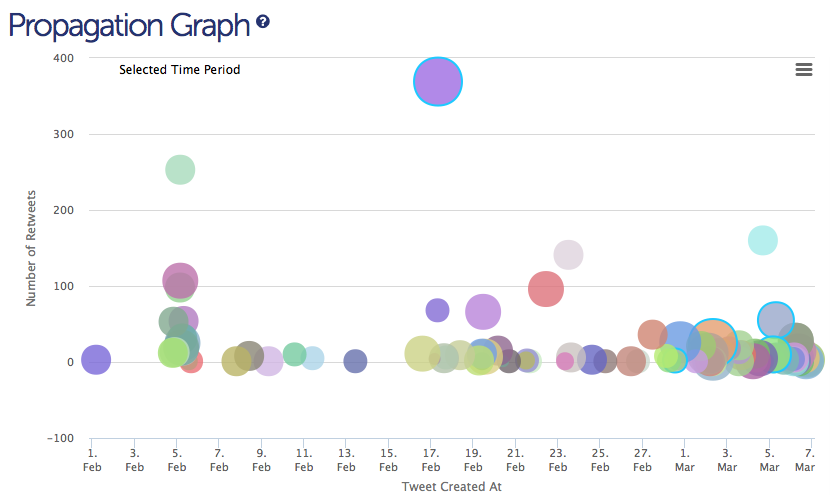TwitterTrails is a system that can easily follow the spread of any set of words on Twitter, including hashtags. Today we followed the hashtag #GRexit, associated with the issue of whether Greece will eventually exit the Eurozone or not. For those following the Greek drama to secure new loans and remain in the Eurozone, it appears that mentioning GRexit has increased in the media in the past month. Discussions about GRexit go back to 2010 but there was never before considered as likely an event to happen as it is now.
Increased mentioning of #GRexit
We collected tweets containing the hashtag #GREXIT on TwitterTrails.com today (warning: this is a large data set and it takes a while to load). Below are some observations from this first collection:
Looking at the time series of the collection, there is, indeed, an increase in the appearance of #GRexit since the Greek elections in January, 25 2015, but the first tweet in our data set goes back almost 3 year: Interestingly, people remember the tweet sent by the then-Economist/Blogger Yianis Varoufakis in May 2012. In this tweet, addressing two reporters, Mr. Varoufakis gives a psychological definition of the term (my translation from Greek):
“Grexit: The unsatisfiable desire of Germany (which, if satisfied, euro collapses). That simple.”
Not sure what Mr. Varoufakis meant by this tweet — let me know if you do. Through his blog and interviews, Mr. Varoufakis is known for writing and saying a lot of things over time. I recall listening to him giving one of his many interviews to NPR in July, 2012, telling the reporter in no uncertain terms that the euro will not exist by the end of August, 2012. Anyway, whatever he meant back then, he is now Finance Minister of Greece and he really has to avoid the possibility of GRexit.
Current visibility of #GRexit
Next, let’s take a look at the tweet Propagation Graph showing what made #GRexit popular recently.
The tweet propagation graph is showing which tweets made the hashtag popular. The highest point in the propagation graph comes from BBC News (World) on 17 Feb, 2015 (the large purple circle) discussing the implications of a GRexit: “What would happen if Greece quits the euro? #grexit“. The attached picture in the tweet shows drachma coins and bills, the expected new currency if Greece were to exit the Euro.
How is the audience following #GRexit
Next, we look at the co-retweeted network (below). Recall that the co-Retweeted network is showing the “main players” among the accounts tweeting about #GRexit, according to the audience. Not surprising, this network is mainly composed of news agencies in European countries. The shape of the network is important as it reveals the degree of polarization of the audience following GRexit.
The more often two accounts are being co-retweeted by others, the closer they appear.
The further they appear, the less they are co-retweeted.
 The group shown at the top of the network (colored yellow) is composed mainly of German news agencies.
The group shown at the top of the network (colored yellow) is composed mainly of German news agencies.
At the other end, the bottom group (colored pink) is composed mainly of pro-Greek government accounts, and near them (colored light green) Greek news agencies. They are as far apart as they can be.
In the middle groups (colored orange, blue and light green), are news agencies from other European countries.
One way to read the co-retweeted network is that the audience in Greece and Germany are exposed to different news. This makes some sense since it is unlikely that news agencies tweet mainly in the language of their audience. But it may also mean that the audiences are exposed to different version of events and are lost in translation. There were at least two misunderstandings that were blamed to inaccurate translation.
We will continue to monitor GRexit on a bi-weekly basis. If you are interested in knowing what happens to the popularity and visibility of the hashtag, stay tuned!


